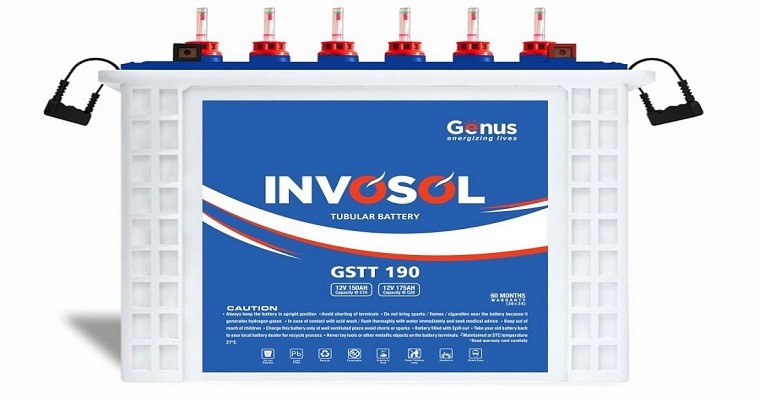In today’s modern world, having an inverter is quickly becoming a necessity. Almost everything around us now works on electricity and long power cuts can cause a lot of issues. An inverter provided backup power when the main supply is cut-off and allows you to switch on the lights, charge your phone, or even watch TV. In addition to the inverter, the battery is also an important component of your power backup system. Buying an inverter battery online or through a dealer can be a tough task, especially if you don’t have a complete idea about which battery to choose.
In this article, we’ll discuss what an inverter battery is, its different types, and the factors you should consider before buying one.
Contents
What Is An Inverter Battery?
An inverter battery is the backbone behind an inverter. It is responsible for storing energy while the inverter is being charged by the main grid and then providing backup power in times of a power cut. Every power backup solution be it an inverter, a UPS, or a solar energy system, requires a battery to store any excess energy and supply it in the time of need. There are different kinds of batteries available in the market and choosing the one that fits your requirements can be a tough task.
Different Types Of Batteries?
GEL Batteries
GEL batteries are similar to traditional batteries and have silica added inside them. GEL batteries don’t require much maintenance as deep-cycle lead-acid batteries are built quite sturdily. These batteries are safe for the environment, valve-controlled, sealed, and completely safe to be used in an inverter.
Flat Plate Batteries
These batteries have been around for a long time now and are relatively inexpensive as compared to the competition. They employ a basic construction and requires regular maintenance with battery cells needing to be toped with distilled water. Flat plate batteries are best used in places that don’t suffer from frequent power cuts. They are built for long discharging and take a lot of time to get charged completely.
Tubular Batteries
Tubular batteries are recommended for areas with long power cuts. They use advanced technology, are more expensive than a flat plat battery and have a longer life span. Tubular batteries require less maintenance and are highly reliable as well. They are built for deep discharging and charge faster than flat plate batteries making them suitable for places with frequent power cuts.
There are two kinds of tubular batteries: short and tall. These batteries require fewer water top-ups and usually last longer than a flat plate battery.
How to Choose the Right Battery?
This three-step process will help you choose the best inverter battery for your home.
Step 1: Identify Your Power Requirements
First of all, you need to list down the appliances and devices you want to use on inverter power. If you plan to just power up basic lights and fans, a moderate capacity battery could be sufficient to fulfil the power requirement for a few hours. However, if you want to power up bigger appliances like a TV or fridge, the battery capacity should be quite substantial then. Understanding your power requirements will help you identify the battery you should buy.
Step 2: Check The VA Rating Of The Inverter
Your inverter’s VA rating will indicate which battery it’ll require. The VA rating indicates the voltage and current supplied to the appliances by the inverter. Most inverters have an efficiency range of 60% to 80% and their power factor also ranges from 0.6 to 0.8. The power factor is the ratio of the power supplied by the inverter to the power required by the appliances.
Step 3: Choose The Required Battery Backup
One of the most important questions while buying an inverter battery online or from a shop is “how many hours do you want the inverter to run?”. You need to select a battery with an appropriate battery capacity which is expressed in Ampere Hours. You can find out how much capacity you need by making a reverse calculation of the power requirement, backup time, and the total battery voltage.
Tips For Buying the Best Inverter Battery
Here are some factors that you should consider while buying an inverter battery for your home.
Frequency Of Power Cuts
While a battery with a large capacity should seem like a great option anywhere, it is important to note that these batteries take a long time to get charged as well. So if you live in an area that encounters frequent power cuts, an inverter battery that can charge quickly would be a better choice. For such places, a tubular battery is a great option as it can be charged faster than other batteries.
Duration Of Power Cuts
The next thing to consider is how long the power is cut-off in your area. Is it for a few hours only? Four hours? Eight hours? The whole day? The longer the power cut, the higher capacity battery you’ll need and the higher the Ampere hour (Ah) rating will be.
Warranty
Inverter and inverter batteries can be an important component for your home and you wouldn’t want to keep repairing it every now and then. This is why a battery warranty is so important. Trusted manufacturers give 3-5 years of warranty for their batteries and provide warranties for replacement and servicing as well.
Pricing
Perhaps one of the most important factors can be budget. While cheap batteries might look like a good investment at the beginning, they can face issues and problems in the future that would end up costing you more money. It is better to go with a trusted brand and pay a bit more money upfront as it would yield a positive ROI later in the future.
This guide should help you in choosing and buying the best inverter battery online or offline. The battery makes up the most crucial part of the inverter and without it, you’ll just have a device that can convert AC power into DC and vice-versa. Choose trusted inverter brands that have been around for some time for your battery and if you have any doubts, you can consult an expert as well.




